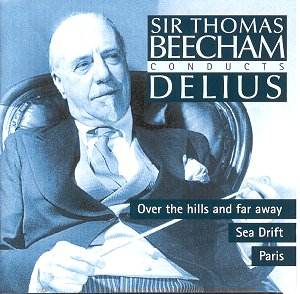Each
of these works featured in the Naxos Historical series of Beecham
recordings from the 1930s which I reviewed recently. Inevitably
struck by the authoritative nature of those performances I felt
that most listeners’ pleasure would be compromised by the poor
sound quality. Enormous strides had been made in recording techniques
in the two decades or so which separate these two series of recordings,
and although these Sony issues are still very much historical
in terms of their sound, this no longer stands in the way of our
enjoyment.
Beecham’s
view of this music stays remarkably consistent, and though he
is marginally more expansive in the later readings he is still
very careful to avoid lingering. This is wholly admirable in music
which risks stagnation if the conductor neglects forward movement
in favour of incidental beauty.
The
magical, evocative opening of Over the Hills and Far Away
is beautifully shaped by Beecham, as is the quiet passage later
on in the work where the harmonies and orchestral colours recall
Grieg. The faster passages, and in particular the thunderous close,
are striking examples of the way Beecham was able to fire up his
players.
The
big, Straussian tone poem Paris is another work containing
music of a forceful nature which we tend not to associate with
this composer. Delius spent many years living in Paris, a city
he loved, and it was there that he met the painter Jelka Rosen
whom he later married. From the mysterious opening – Paris by
night? the Seine? – to the passages suggesting café music
and amorous rendezvous the music is masterly, extremely evocative
and atmospheric. Beecham is masterly too, superbly at one with
the spirit of the work and encouraging his musicians to wonderful
playing.
The
recording in Over the Hills and Far Away is very good for
its period. There is a certain hardness to the sound, of course,
but orchestral detail is audible. The sound breaks up slightly
on timpani rolls, but this is of little importance, and in any
case there is simply no comparison between this and the sound
of the 1936 recording. Paris receives a recording which
is even a little sweeter and richer.
Sea
Drift is not an easy work to bring off. The score suggests
an approximate timing of thirty minutes, but Beecham took slightly
under twenty-four minutes in 1936, and a minute or so longer in
1954. Richard Hickox adds rather more than another minute in his
Chandos recording. If the overall pacing of the work is too slow
the result will be lachrymose and we will lose our patience, and
hence our sympathy, with the grieving he-bird whose mate disappears
one day and never returns. Conversely, this poses problems in
one or two faster passages of choral music where any suggestion
of jauntiness would be totally out of place. It is here that I
find Beecham’s later reading to be markedly superior to the earlier
one, with these faster choral passages better integrated into
the overall conception of the piece. The actual recorded sound
of the chorus in 1936 was particularly disappointing, distressingly
dim and lacking in bite, with many of the inner lines inaudible.
In 1954 the chorus is still recorded distantly, but far more of
the music can be heard, and the sound of the four voices is much
better integrated. The choir sings very well with excellent diction.
The soloist, Bruce Boyce, is less successful than his 1936 Australian
counterpart, however. "O I am very sick and sorrowful"
he sings at one point, but his rather all-purpose sadness leads
to a lack of variety of characterisation, and such moments as
this pass for nothing. Technically his singing is difficult to
fault, and his voice is extremely beautiful: listen to the exquisite
cadence at the end of "… this gentle call is for you, my
love, for you." But the tone is unvaried, and Sea Drift
needs more than this. He is placed nicely just in front of the
orchestra, with the choir more distant. One or two instruments
are artificially helped, with the strange result that the solo
violin and the two harps appear in jumbo-sized incarnations, playing
much louder at certain moments than the singing of the whole chorus.
As in 1936 Beecham is careful to keep the music moving forward,
but in the later recording he is even more successful at creating
the very particular atmosphere of this work: loss, mourning, the
devotion of the one creature for another, the natural world. He
also takes more time over the long, slow passage which precedes
the final pages, and the effect is less brisk overall where there
was before an almost businesslike quality; it’s more affectionate,
but still totally lacking in self-indulgence. It’s a great performance,
though the rather monochrome soloist does count against it.
There
are other outstanding performances of these pieces to be had.
Sir Charles Mackerras conducts a superb reading of Paris
on Classics for Pleasure, and both of Richard Hickox’s readings
of Sea Drift are excellent. But comparisons are irrelevant,
I think, given the more than acceptable sound and the special
status of these performances. Beecham, in a class of his own,
is not to be missed.
William
Hedley
See also reviews by Stephen
Lloyd and Rob
Barnett
